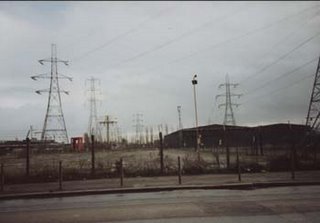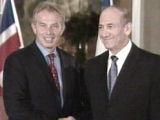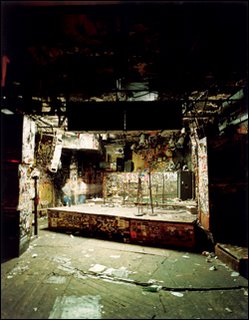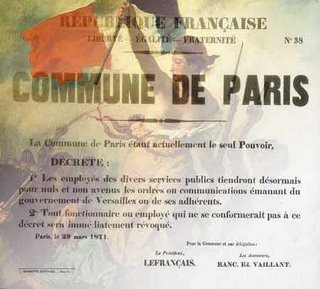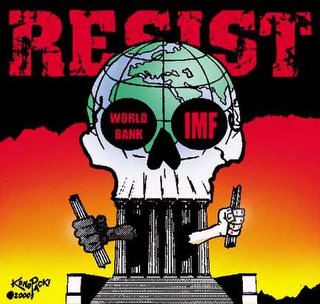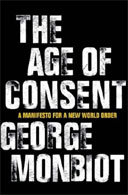
In 1990, on the eve of the first Gulf War, the United States was attempting to pass a resolution through the UN Security Council which would sanction the invasion of Iraq. Of the temporary members of the Council, Zaire, Colombia, Ethiopia were reluctant, and Yemen and Cuba were in outright opposition to the resolution.
The reluctant parties quickly saw the advantages of the invasion after they were offered free oil from the United States' friends in Saudi Arabia, and the resolution was thus passed. But although their opposition carried no weight, Yemen still voted against it. Very shortly afterwards, the US cancelled its $70m annual aid package to Yemen.
In his 2003 book
The Age of Consent, George Monbiot uses this episode to illustrate how the Security Council works. "It claims to sustain a world order founded on right rather than might. The problem with the postwar settlement is that those with the might decide what is right."
The UN, he claims, is fundamentally unreformable. Why?
Firstly, the five permanent members of the Security Council can veto any SC resolution, any general reform to the UN constitution, any appointment to the post of Secretary General, any election of a judge to the International Court of Justice, and any admission of new member states. This power of veto means that any motion will always be designed to appease the P5 (who are also, incidentally, the five biggest arms dealers in the world) so that, as Monbiot states, "they can assert their will without even having to ask."
Secondly, the rest of the UN is no more democratic or accountable. I am a fairly well-read, worldly-wise person - I would say more so than the average person. I should therefore know the name of my country's UN ambassador, says Monbiot, and so should you. But I bet neither of us do, partly because we never voted for him, not even indirectly*. And yet this man is our representative in an institution which is supposed globally to act on behalf of the citizens of its member states. As a result, the British public was overwhelmingly in favour of a ceasefire in Lebanon two months ago, and yet our government vetoed that resolution in favour of continued bloodshed. Not in our name, indeed.
Whereas the UN might claim to act on our behalf, the World Bank, IMF and WTO are even more brazenly imperious. The World Bank and IMF both require 85% majorities to pass or amend any substantial resolution. The US hold over 15% of the votes in each organisation. In other words, the US can singlehandedly block any resolution which is not in its interests. Similarly, the WTO's agenda is almost entirely formulated in the Green Room negotiations held by the EU, US, Canada and Japan.
So what do we do about all this? Monbiot is right to say that these institutions are unreformable - they are so autocratic, so subservient to the demands of late capitalism, so unbalanced in terms of power, that we would be wasting our time trying to amend them. In any case, how would you go about reforming the SC? In last weekend’s Guardian,
Paul Kennedy explained the impossibility of such reform:The proposals for reforming the security council take a twin track: given the power conferred by the veto, the idea would be either to increase the number of states who would enjoy permanent veto status, or to reduce the scope of veto privilege or eliminate it altogether. These are rather contradictory demands, but either would bring a dramatic shift in the balance of power at the UN and, say its advocates, make it more effective. Neither proposal, in fact, is likely to go far, as all such moves run into the well known catch-22 "trap" of the UN charter. In 1945, the five victor powers gave each other the right to veto, and then froze that privilege in a constitution that they and all other member states pledged to respect. Thus, any future attempt to alter the status of the "high table" powers, or to increase or decrease their number, could only succeed if the veto was not wielded. Any one of the permanent five can, and would, bring a proposal for change to a grinding halt. But among the depressing statistics (over a billion people living on less than a dollar a day while the 10 richest people earn $266 billion between them), Monbiot spies an opportunity to globalise democracy.
He claims that the globalisation of capital which has arisen from the fall of socialism and the rise of economic liberalism has broken down aspects of national identity. It has created two antagonistic global classes: those who hold power, and those who do not. The latter category represents the majority of people in every country of the world. Monbiot claims that this product of a late capitalist world will create a new kind of class consciousness, the realisation of a new human species which will cooperate to wrest power away from the ruling class.
This evokes a story Zizek tells, where in the 1990s a Serb and an Albanian are debating the conflict in the Balkans on TV. A western pacifist intervenes and says something to the effect of, "well, whatever you do, please promise me you will carry on debating and not blow each other up." The Serb and the Albanian turn and look at each other as if to say "what?! does this guy not know anything?!" The pacifist has united the two enemies by the racist and clueless assumptions he betrays. There is hope is this union, but it requires a division to give birth to it. I find it naive to accept that, in our shared status as victims of power and/or capital, east and west will be able to unite with enough force to overthrow the ruling classes. I tend towards the pessimistic view that our divisions might be stronger than what brings us together.
Nevertheless, let's hear Monbiot out, for he does not pretend that such a revolution will be easy or immediate. How does he see it transpiring?
He correctly rejects anarchism as a political force, noting that absolute freedom exercised by rival powers is almost bound to end in conflict, and that market fundamentalism (which is the dangerous embodiment of absolute freedom exercised by rival markets) is really only a form of anarchism. He also rejects Marxism on the basis of Marx's comments about the peasant class in the Communist Manifesto. This is far from convincing, though it does root out the potential for totalitarism in communist revolutions. But it means that Monbiot is left with only one alternative: democracy.
From this point on, the book becomes extremely problematic, though always impassioned and generally inspiring. Monbiot is breathless about his proposals for a world parliament. His idea is that every adult on the planet has a vote, and that the parliament has 600 representatives, each with around 10 million constituents. He costs it out, estimating that a worldwide election (which would also be a referendum on whether the parliament should exist) would cost 5 billion dollars, the parliament would cost 300m dollars, and that running costs would be around 1 billion dollars per year. He even comes up with some suggestions as to how to raise such sums.
It is problematic because of his opaque definition of democracy, which takes little account of how power is generated. Monbiot may reject Marx’s proposals for revolutionary communism, but his approach would benefit from a more materialist analysis of the world. As it stands, Monbiot’s parliament has the appearance, rather than the essence of democracy.
Make no mistake, even a semblance of participative democracy is a seductive and radical idea. To take an example in Haringey, where I work, a quasi-parliament of older people began in 2002, and has quickly expanded to a membership of over 600 (still only about 3% of people aged 65+ in the Borough). The self-proclaimed role of this forum is to debate issues relevant to older people, provide advocacy and social networks, and to challenge statutory authorities when they enact a policy which the forum believes will negatively affect older people. Members of the forum (a few of whom are ex Councillors, but most of whom are lay people) sit on most influential planning committees and their ideas are taken seriously by planners in the Council and the Primary Care Trust. I attend their open meetings, where up to 200 older people come together to debate and collate their views on the agenda of the day. It can be powerful and heady stuff.
So far, however, it has not deterred the Council or the PCT from making swingeing cuts to services. Since the forum was created, two Local Authority older people’s care homes have been disposed of, a significant proportion of home care for older people has been contracted out to private providers, management of all Council housing (including sheltered housing) has been transferred to an ALMO, and as part of the austere financial measures being taken by the NHS, the PCT has made sweeping cuts to services, especially to much-needed dementia facilities.
The forum has officially opposed most of these moves, and has expressed its dissatisfaction to the highest authorities. They have been told that there is no alternative: it is central government funding which produce the cuts. The result is that the forum opposes the policy in theory, but pragmatically accepts it in practice, and the authorities use the forum’s hesitant acquiescence as proof that they have consulted older people and obtained their backing.
This sort of democracy can be self-fulfilling. Just as the essence of dating is actually the clichéd stuff that happens on the surface, so the essence of democracy becomes pure appearance. This is why somebody like John Reid can take a situation where he is booed and heckled while making a speech, and plausibly turn it into a situation where he defends the heckler’s right to heckle. This is one step down from my example of the older people’s forum, in that the government do not care what the people believe so long as they can claim to have consulted with them in their “totalitarianism-with-a-human-face” style. John Reid, an unreformed Stalinist, believes democracy is simply letting people open their mouths.
The latter part of Monbiot's book are more materially based. It proposes adjusting trade mechanisms so that wealth accumulated through capitalism finds its way to the poor once in a while. This is all well and good, but it does rather bring to mind the old cliche about scraps being thrown from the rich man's table.
As Alex Callinicos said in his review of The Age of Consent,
Appalling and growing inequalities divide rich and poor throughout the world. But what drives this process is not trade, but the investments that allocate resources for economic purposes. Currently the bulk of investment is controlled by a few hundred multinational corporations who concentrate largely on the rich countries. Hardly any countries in the South, apart from China, receive significant foreign direct investment. They are the victims of what the sociologist Michael Mann has called "ostracising imperialism" - effectively excluded from the global production system. The investment decisions of the big corporations do not involve the rational allocation of resources to meet human needs. They are driven by a blind process of competition in which firms vie to grab a larger share of markets and profits than their rivals. None of this means we should not support Monbiot’s proposals. He gives us 261 pages of reasons why universal democracy should be at the top of our agendas, and this is thoroughly laudable. But real democracy cannot be achieved unless people control the economic life of society. Strengthening the ideological nous of marginalised people, or attempting to reform capitalism so that it benefits those people will help, but it is not enough. Only when people control the heart of the economy will they be able to generate their own destinies. It is up to every supporter of democracy to recognise this fact, and then decide whether to act upon it. Reading
The Age of Consent will be an invaluable way of venturing down this path.
* His name is Sir Emyr Jones Parry. Nuff said.

